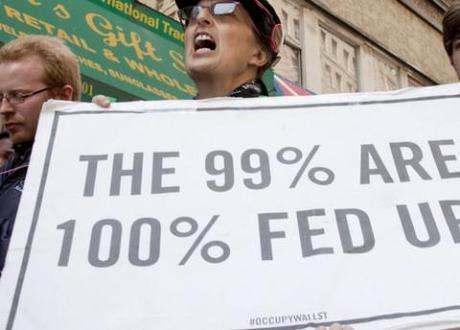 Occupy Wall Street. Photo credit: Glynnis Jones / Shutterstock.com
Occupy Wall Street. Photo credit: Glynnis Jones / Shutterstock.com
The background
Protestors took to the streets of New York on Monday 17th September 2012 for the first anniversary of Occupy Wall Street (OWS). According to The New York Times, around 200 gathered at Zucotti Park, the scene of the OWS protest camp until police removed protestors on 15th November 2011.
In the wake of the New York protests against social and financial inequality in 2011, the Occupy movement spread around the US and the world. But one year on, some commentators are questioning whether OWS has run out of steam.
Occupy achievements
What has Occupy really achieved in concrete terms? “Big, powerful banks remain big, powerful banks. Unemployment is still high, Americans’ home equity and personal savings are depleted, and total student loan debt tops a record $1 trillion,” said Time. But on the other hand, the movement has notched up some successes, such as helping to generate public anger at debit card fees and fighting for student loan relief. “There are a few notable changes in the financial industry that took place post-Occupy; while they might have occurred even if nobody ever held signs or chanted ‘we are the 99%’ in Zuccotti Park, those protesters captured the zeitgeist in a way that few other social movements can claim.”
Occupy is not over
Some commentators have argued that Occupy has fizzled out, wrote Frances Fox Piven in The Guardian, but as long as the anger that fueled the movement remains, the protests will continue: “Like earlier great movements that changed the course of American history, Occupy is fueled by deep institutional lacunae and inconsistencies. The mainly young people who are Occupy represent a generation coming of age in societies marked by an increasingly predatory and criminal financial capitalism that has created mass indebtness and economic insecurity.” And the movement has certainly had an effect: “We can see the influence of the movement’s main issue – extreme inequality – on the speeches at the Democratic convention, for example, or on the ongoing strike of 29,000 school teachers in Chicago.”
Occupy movement is stuck
“Occasional massive outpourings of support for the big marches last fall, usually in the wake of police violence, masked the fact that Occupy never grew past a few thousand committed activists spread across the country,” said Matt Taylor at The Daily Beast. The movement may have influenced political dialogues, as can be seen in the US presidential election campaigns, but Occupy itself is struggling to find a place in society: “So long as Occupy remains a symbolic phenomenon that exists only to sustain its own subculture—to speak to its own members—it won’t be able to tap into the broader economic anxiety that is still festering across a battered, wary electorate.”
Occupy has faded but new movements may appear
“The Occupy protesters, even at their greatest numbers, were never able to do what successful movements must do in terms of developing a well-thought-out strategy, clearly articulated political demands, a logical sequencing of tactics and well-trained and disciplined activists who don’t vandalize property or fight cops,” wrote Stephen Zunes at CNN. “Indeed, the Occupy protesters never developed enough of the structural elements necessary to truly be considered a movement’.” But so long as the concerns of the 99 percent remain, “don’t be surprised if new incarnations of the Occupy movement emerge in the near future”.

